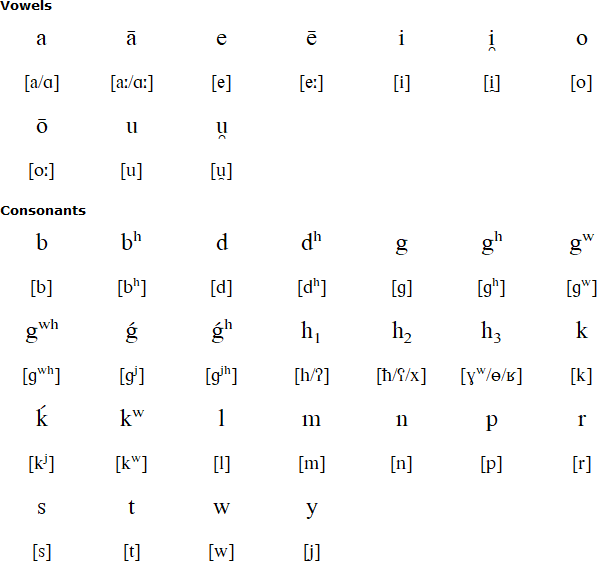Proto-Indo-European (PIE) is the reconstructed ancestor of the Indo-European languages. It is thought that PIE was spoken during the late Neolithic and Early Bronze Age - about 4500 - 2500 BC, possibly in Pontic-Caspian steppe north of the Black Sea. Another theory is that the PIE speakers originally came from Anatolia (modern Turkey).
In 1786, William Jones, a British philologist in Bengal, suggested that Sanskrit, Latin, Greek and other languages possibly share a common ancestor, and is considered by many to be the father of Indo-European studies. However, since the 16th century other people have noticed similarities between European and Indo-Iranian languages, and have speculated about possible links between them.
PIE was reconstructed by comparing modern Indo-European languages, and their known ancestors, and applying what is known about how sounds change over time to determine the most likely ancestral words.
Based on the vocabulary of PIE that has been reconstructed, it is thought the Proto-Indo-Europeans were nomadic pastoralists who had domesticated horses and used wheeled vehicles. They gradually spread across west into Europe, south into India and neighbouring areas and as far east as China.

Note: there are various theories about how PIE was pronounced, and different ways to represent its sounds in writing.
Download an alphabet chart for PIE (Excel)
h₂ólyoes ǵʰmónes h₁léwdʰeroes somHóeskʷe gʷr̥Htóteh₂ti h₃r̥ǵtúsukʷe ǵn̥h₁yóntor. éybʰos dh₃tóy ménos ḱḗrkʷe h₁stés h₂énteroeykʷe sm̥h₂éleyes bʰréh₂tr̥bʰos swé h₂éǵoyh₁n̥t.
Translation by Giorgio Nagy, supplied by Corey Muray
All human beings are born free and equal in dignity and rights. They
are endowed with reason and conscience and should act towards one another
in a spirit of brotherhood.
(Article 1 of the Universal Declaration of Human Rights)
A tale written in PIE by 19th century German linguist, August Schleicher.
Avis, jasmin varnā na ā ast, dadarka akvams, tam, vāgham garum vaghantam, tam, bhāram magham, tam, manum āku bharantam. Avis akvabhjams ā vavakat: kard aghnutai mai vidanti manum akvams agantam. Akvāsas ā vavakant: krudhi avai, kard aghnutai vividvant-svas: manus patis varnām avisāms karnauti svabhjam gharmam vastram avibhjams ka varnā na asti. Tat kukruvants avis agram ā bhugat.
Schleicher's version of the tale.
h₂áu̯ei̯ h₁i̯osméi̯ h₂u̯l̥h₁náh₂ né h₁ést, só h₁éḱu̯oms derḱt. só gwr̥hxúm u̯óǵhom u̯eǵhed; só méǵh₂m̥ bhórom; só dhǵhémonm̥ h₂ṓḱu bhered. h₂óu̯is h₁ékwoi̯bhi̯os u̯eu̯ked: “dhǵhémonm̥ spéḱi̯oh₂ h₁éḱu̯oms-kwe h₂áǵeti, ḱḗr moi̯ aghnutor”. h₁éḱu̯ōs tu u̯eu̯kond: “ḱludhí, h₂ou̯ei̯! tód spéḱi̯omes, n̥sméi̯ aghnutór ḱḗr: dhǵhémō, pótis, sē h₂áu̯i̯es h₂u̯l̥h₁náh₂ gwhérmom u̯éstrom u̯ept, h₂áu̯ibhi̯os tu h₂u̯l̥h₁náh₂ né h₁esti. tód ḱeḱluu̯ṓs h₂óu̯is h₂aǵróm bhuged.
A modern version based on the work of H. Craig Melchert
Hear this tale:
Information about Proto-Indo-European | Numbers | Family words
Information about Proto-Info-European
https://en.wikipedia.org/wiki/Proto-Indo-European_language
https://en.wikipedia.org/wiki/Proto-Indo-European_phonology
https://en.wikipedia.org/wiki/Indo-European_vocabulary
https://lrc.la.utexas.edu/lex
http://pielexicon.hum.helsinki.fi/
https://indo-european.info/
https://www.archaeology.org/exclusives/articles/1302-proto-indo-european-schleichers-fable
Page last modified: 14.04.24
[top]
You can support this site by Buying Me A Coffee, and if you like what you see on this page, you can use the buttons below to share it with people you know.

If you like this site and find it useful, you can support it by making a donation via PayPal or Patreon, or by contributing in other ways. Omniglot is how I make my living.
Note: all links on this site to Amazon.com, Amazon.co.uk
and Amazon.fr
are affiliate links. This means I earn a commission if you click on any of them and buy something. So by clicking on these links you can help to support this site.
[top]